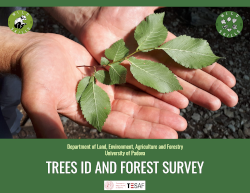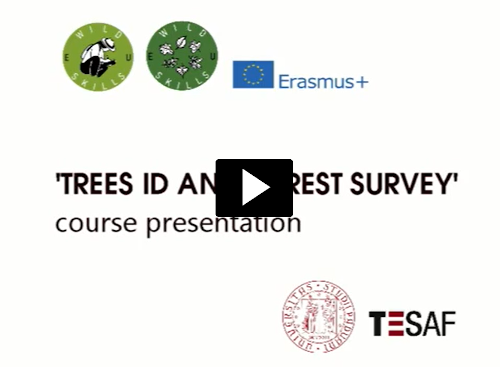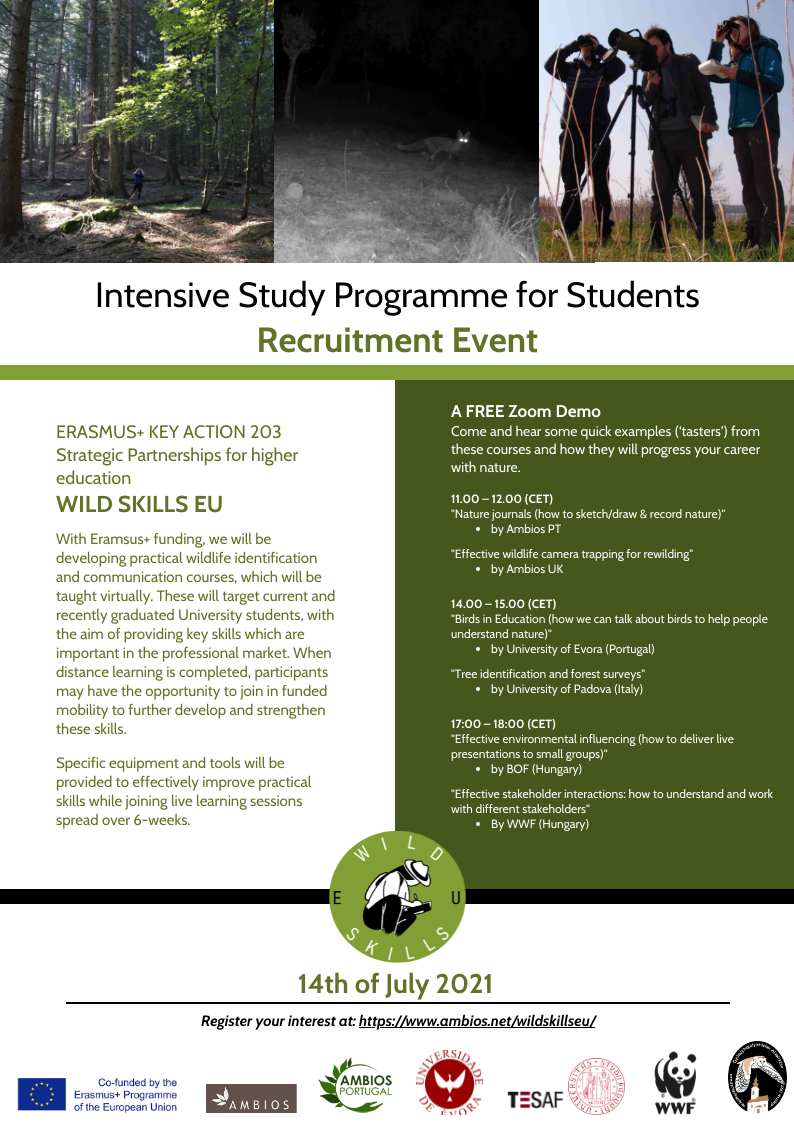WildSkills_EU

Acronimo: WildSkills_EU
Titolo:"Tackling skills gap in the wildlife conservation sector"
Bando: 23_04_2020
Durata: months 30 (01/10/2020 – 31/03/2023)
Coordinatore: Ambios Ltd, UK
Budget totale EU: € 369.600,00
Budget TESAF: € 47.170,00
Responsabile scientifico: Sitzia Tommaso
Team: Pettenella Davide, Sitzia Tommaso, Campagnaro Thomas, Alessia Portaccio
Riassunto: The WildSkills EU project will address the skills gap identified by employers responsible for biodiversity monitoring and climate change mitigation.
Here there is a mismatch between employer needs for early career staff to possess both ‘practical wildlife survey and identification’ and ‘communication and stakeholder engagement’ skills and the absence of this training from Higher Education pathways. The project will be a collaboration that links practitioners from Non-Governmental Organisations (NGOs) with teachers from the world of Higher Education. Together the partners will develop innovative and accessible distance learning packages to address these skills gaps using a virtual learning environment that combines the use of physical equipment with online webinars and livestream technologies that can deliver, assess, credit and endorse acquired skills. The project will train the trainers in delivering this unique model and share the good practice established as a result.
The objectives of the project are to:
- Develop 6 distance learning modules within an Open Education Resource covering 3 critical skills gaps with key elements translated into native languages;
- Develop and test a new digital pedagogy of distance learning skills delivery and assessment leading to employer and HE recognition;
- Train more than 20 trainers in the use of this new digital learning and assessment pedagogy;
- Establish a platform for sharing pedagogy best practice with practitioners.
The European network provided by this project partners is an ideal place to explore, share and promote new systems of skills learning in the context of different cultures - a transnational approach is ultimately the only way to ensure sustainability of life on planet earth.
Sito Web: https://www.ambios.net/wildskillseu/
Course TREE IDENTIFICATION AND FOREST SURVEY held by Università degli Studi di Padova - Dept. of Land, Environment, Agriculture and Forestry
The courses consisted of 6 Learning Modules, which have been delivered in 3 blocks, from February to July 2022. Each Module comprehended online lectures with links to external sources and reading materials, sections for fun facts or in-depth analysis, interactive activities, and weekly assignments. For each module, a live evening session has been organised and held through the Zoom platform, to allow for in-depth analysis of the topics, interactive activities, and feedback about the exercises and assignments.
The general objectives of the course were: to develop basic technical skills in trees and forest surveys for conservation; to give some guidelines and illustrate the principles for tree species identification; to transfer the main information about trees, forests and about habitats and ecosystems they are part of; to raise awareness on the importance of forests, trees, and their biodiversity and indicated the related main sources of information; and, in the end, to give some insights on the instruments and methodologies for the forest survey.
Contents
Module 1: Introduction to European trees and forests
- Learn the definitions and related information about trees and forests
- Learn the importance of trees and forests for the planet and the human society
Module 2: State of the art of European forests and their biodiversity
- Get an overview of the status of forests
- Learn how and where to find data and facts about forests
- Deepen the correlation between forests and biodiversity
Module 3: Tree species identification
- Learn how to identify tree species.
- Learn a range of principles and distinctive features to be observed to identify trees.
- Learn the changes that tree species might go through during the seasons.
- Learn how to use instruments and consult resources for the identification of trees.
- Get some additional information on trees and the world they concern
Module 4: Forest vegetation classification
- Learn how to classify forest vegetation.
- Learn what are forest types.
- Learn how to describe a forest plant community.
- Get some additional information on European forests
Module 5: Measuring trees and survey techniques
- Get an overview of the equipment used for forest measurements and survey
- Learn how to plan and carry out forest sampling and surveys
- Learn the main forest variables and parameters of interest
- Get an overview of the different techniques to collect data in the field
Module 6: The relevance of forest data
- Learn the main ways to elaborate and analyse forest data
- Get an overview of the application of forest data

On the 14th of July, a demonstration of the courses will be provided through free Zoom sessions: quick examples of the courses and how they will progress your career will be given by each project partner.
To subscribe to the event: https://www.ambios.net/wildskillseu/
The brochure of the event can be downloaded from the link below.
Download brochure (PDF 6.4 Mb)







